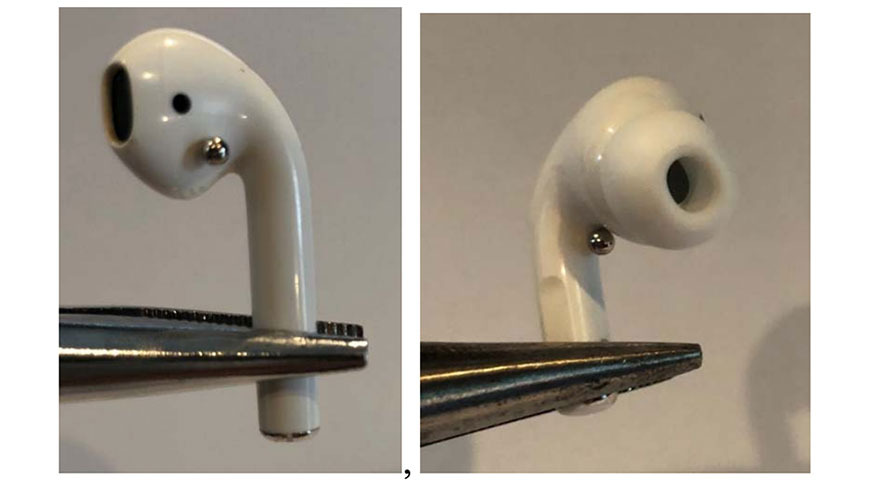A lawsuit leveled against Apple on Tuesday claims the company's latest designs, including AirPods and Powerbeats Pro products, infringe on patents covering magnetic earbud cases.
Filed in the U.S. District Court for the Southern District of Texas, the complaint from GUI Global Products, Ltd., operating under trade name Gwee, claims Apple infringes on four patents detailing methods of securing, controlling and charging earbud headphones in a case via magnets.
Gwee's U.S. Patent Nos. 10,589,320, 10,562,077, 10,259,021 and 10,259,020 each cite company cofounders Walter G. Mayfield and Dan Valdez as inventors, and describe systems in which a switching device is magnetically coupled to an electronic device. In certain embodiments, a portable electronic device nests into, and receives control signals from, the switching device and is further protected from the elements by a hinged lid.
Apple's AirPods, AirPods Pro and Powerbeats Pro sport features similar to those described in Gwee's IP. Both product lines incorporate methods of magnetically securing earbuds in a form-fitting case that also acts as a portable power supply. Control signals activate and deactivate the earbuds when the lid of the case is opened and closed, mimicking behavior discussed in Gwee's patents, the suit claims.
Whether Gwee's IP is enforceable or even relates to Apple's technology is unclear. Each patent is primarily concerned with lens cleaning devices that attach to another product — a floating sunglass case is described in one example — through magnets. These magnets can, in some embodiments, activate a switch that controls certain functions of a host device.
"In addition to their cleaning functionality, the cleaning components of the application have a functionality of being able to active magnetic switches on devices having such switches. This is particularly useful in saving battery life as it does not require the cover of such devices to be closed (the normal mode for activation of such switches)," the '320 patent reads. "In the use of tablet devices having a magnetic switch, the cleaning components are particularly useful as the tablet can be put into hibernation mode with a single touch to the cleaning component as compared to the multiple touches required to do the same thing using the touch pad of the tablet."
Each patent contains multiple aspects that build on the magnetic attachment theme, including contingencies for devices "without a cleaning component" like a vaguely defined "wireless earbuds" product. No patent specifically or comprehensively details a headphone retainment, charging and control system as employed by Apple in its wireless headphone lineup, though such capabilities are alluded to in patent claims.
Gwee seeks damages and court fees in its suit against Apple.
 Mikey Campbell
Mikey Campbell







-m.jpg)






 Marko Zivkovic
Marko Zivkovic
 Christine McKee
Christine McKee
 Andrew Orr
Andrew Orr
 Andrew O'Hara
Andrew O'Hara
 William Gallagher
William Gallagher

 Mike Wuerthele
Mike Wuerthele
 Bon Adamson
Bon Adamson




-m.jpg)



4 Comments
Check out the Gwee story here:
https://gwee.com/about/
Seems that 2011 is when they claim to have come up with their brilliant insight into cleaners. Note the patents they cite were filed in December 2017 and 2019; after AirPods had been released (of course they claim non-provisional and provisional filings going back to 2011). Wonder why they are not suing all of the other wireless headphones that use magnetic cases to hold them? Hmmm. It was hard for me to stop laughing when I saw their website.
Oh, and tin the lawsuit hey claim that the infrared sensor and the microphone in AirPods are lenses (since lenses are mentioned in the patent)!
I bet it’s cheaper for Apple to submit patents for anything that is working on, as opposed to leaving an opportunity for legal trolls.
I do not usually make comments but is not all of this after Apple MagSafe Adapters? It seems that all of the devices in question are all a derivative of MagSafe which Apple officially announced at MacWorld back on January 10, 2006. And yes, I was there for the announcement and I did purchase several generations of MacBook over the eons that used a “magnetic connector” aka MagSafe.